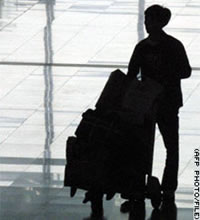Business travel by air is likely to increase by about 10 percent in 2005 after an initial recovery in 2004 but the uptick is seen aiding mainly low-cost carriers, a U.S. industry survey released.
Major airlines are expected to remain under pressure from falling air fares, permanent cutbacks in business travel, greater use of low-cost carriers and alternatives like video conferencing, said Kevin Mitchell, chairman of the Business Travel Coalition, which represents corporate travel managers.
The group, which surveyed North American business travel spending by 112 major companies, sees fares remaining flat or declining by up to 3 percent in 2005.
Mitchell predicted more restructuring of major airlines like US Airways, and said one or two could fail in the next year.
He said the companies participating in the annual survey would spend a projected $1.09 billion on air travel in 2004.
That was up about 4 percent from 2003, but still about 30 percent lower than business travel levels in 2000, before the Sept 11, 2001 hijack attacks depressed air travel generally.
Fifty-two percent of the companies surveyed in 2004 expect air travel spending to remain flat or decline in 2005, but 45 percent expect an increase of 14 percent on average, he said.
Overall, the group forecast a 10 percent increase in spending on business flights.
This is the first projected increase recorded since the group began surveying the industry in 2001, Mitchell said.
Mitchell said the survey provided more evidence that the decline in business travel which has fueled a downturn at major U.S. airlines was structural, not cyclical, noting legacy carriers needed to adjust to a lower level of business travel.
He attributed the change to growing pressure on companies to trim costs in a global marketplace and an unprecedented range of alternatives, including videoconferences.
Seventy percent of the companies reported increased use of low-cost airlines in 2004 and said they expected greater use again in 2005. On average, those companies expected to increase their use of low-cost carriers by 10 percent in 2005.
The survey showed a 30-percent drop in the price of average one-way fares, a further increase in the use of non-refundable tickets and increasing use of online booking tools.
Seventy-three percent of the companies said they increased the use of Web, video or teleconferencing in 2004, and 34 percent said they used a corporate online booking tool.
Peter Buchheit, travel manager at power tool and hardware manufacturer Black & Decker Corp., said the average price of booking a one-way ticket online for his firm was $214, compared with $248 for a traditional telephone reservation.
He said Black & Decker also hosted 50 percent more "virtual" meetings in 2004, reaching 7,300 employees, compared to 4,500 people a year earlier, and that eliminated the need for increasing amounts of business travel.




 By: N. Peter Kramer
By: N. Peter Kramer
